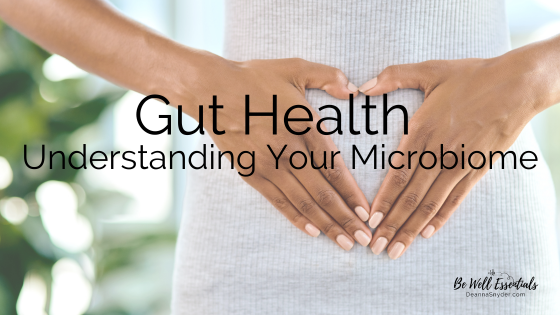Gut Health Understanding Your Microbiome
Saturday September 9, 2023

Did you know that around half of your body is made up of microbes? In fact, there are over 100 trillion of them living on or inside you – and collectively, they may weigh as much as five pounds!
Every individual has a unique microbial composition – like a fingerprint – that communicates with the rest of the cells in the body. Research has shown that these single-celled residents are linked to almost every chronic disease and condition – as well as overall health and well-being.
The gut affects nearly every system and organ in the body. Research has linked gut health to a host of chronic conditions, and many believe it holds the key to physical, emotional, and mental well-being.
If you are like me, I had no idea that what a microbiome was or what it did. It is often the forgotten organ and yet it is the foundation of our health. I have always had stomach issues due to years of antibiotics, hormone-disrupting products, and environmental toxins.
I never understood why my body was failing me.
As I started my natural wellness journey, I discovered that my reactive approach to my health was addressing the symptoms and not the root cause. I took my years of knowledge gained by caring for critical care patients and applied that to becoming more proactive about health and wellness. I went back to school and was certified as an Integrative Nutrition Health Coach in February 2015 and was certified in Gut Health last year.

Ninety percent of diseases are caused by lifestyle choices and not heredity. Over the next few months, I will empower you to help you maintain your gut health using natural solutions.
The Development of the Gut Microbiome
The microbiome plays an important role in our overall health: aiding in digestion, protecting against disease-causing bacteria, producing vitamins, and supporting and regulating the immune system. But how and where does the microbiome originate? Recent research has shown that our microbiome health starts before birth! Before conception, the condition of our mother’s gut health can impact pregnancy and her unborn child. A compromised microbiome during pregnancy may increase the risk for certain complications and impact the health of the baby. How we enter this world is born is another factor in our microbiome health. Babies that are born vaginally vs cesarean section are exposed to different bacteria that support the microbiome. As we mature into adulthood our microbiome reacts to our environment and what we put on and in our bodies.
Bacteria… The Good, the Bad and the Ugly
Bacteria come in all shapes and sizes. Some are beneficial and others are not. If you have ever had food poisoning, you know those are the bad/ugly foes!
There are two main types of bacteria:
- Aerobic: need oxygen to survive (tend to be more pathogenic-causing disease).
- Anaerobic: cannot survive in oxygen-rich environments.
Good bacteria in the gut can help regulate hormones, eliminate toxins, create natural antibiotics, are key influencers in obesity and diabetes, and directly affect the immune system.
The ratios of different gut bacteria can reflect or influence weight, insulin resistance, inflammation, and hunger.
Dietary changes can alter our gut bacteria, both short- and long-term, Diversity in our diets matters!
- Bacteria can change quickly based on the foods we eat.
- The Standard American Diet (SAD) seems to correlate with lower diversity, which can lead to chronic health conditions.
- Greater bacteria diversity equals a healthier and more resilient gut ecosystem.
To lay the foundation of gut health, here is a glossary of terms to help you on this journey:
Commensal bacteria: Bacteria that protect an organism against pathogenic microorganisms or do no harm. They serve as protection by competing for nutrients and space.
Dysbiosis: A microbial disturbance or imbalance within an ecosystem of the body caused by changes in the types and numbers of bacteria in the gut. Dysbiosis is linked to disease. The prefix dys means “bad, ill, or abnormal.” Basically, dysbiosis is when the ratio between bacteria is off in a way that becomes unhealthy for a person.
Endotoxins: Toxins that are present inside a bacterial cell and released when the cell disintegrates.
Epigenetics: The study of changes in organisms that are caused by how a gene is expressed, rather than an actual change to the genetic code; used to describe how we can turn genes on or off to prevent or cause disease.
Germ-free: Raised and kept in a sterile environment with no microbes. Many studies are compared against germ-free environments that do not exist outside a lab.
Microbes: A collective term for the microscopic organisms that can include bacteria, fungi, archaea, protozoa, and viruses.
Microbiome: A collective habitat of microorganisms that live in and on the body, including the microbes themselves, their genome, and their surrounding environment.
Microbiota: The microorganisms that reside within a given environment inside the body; similar to the microbiome but refers to just the microbes.
Opportunistic microbes: Microbes that can remain neutral and dormant in the body, not causing harm, but may disrupt the microbiome and can cause disease when the immune system is weakened.
Pathogenic microbes: Bacteria, fungi, protozoa, and parasites that can cause disease upon entering the body.
Prebiotics: Selectively fermented or nondigestible food ingredients that when consumed help support the growth of health-promoting bacteria.
Probiotics: A collection of strains of live bacterial organisms that when taken in proper doses can have positive effects on health and digestion.
Synbiotic: A combination of probiotics and prebiotics.
Next month I will dive a little deeper on how to help support your microbiome using natural solutions.
I invite you to hop on over to my Insta and/or Facebook pages this month. as I share my passion for turning to nature to support our bodies, caring for ingredients in the products that I use that are sustainable and non-toxic. I'll empower you with nutrition and supplement tips to support you from the inside out! Plus, I will give you a little insight into how "the doTERRA" difference is impacting our planet with the sustainability efforts we have with our farmers, partners, and customers
Until the next time,
Be Well, Deanna
Peace. Love. Oils.


